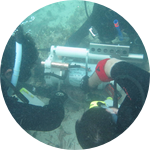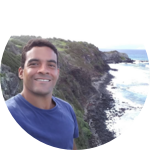About This Project
This research focuses on coral adaptation and bleaching resistance processes to better understand reef resilience and reef decline on Maui (Hawaii). The work focuses on the identification of resilient corals folded into management options and interventions of reef restoration. Maui’s coral reefs are impacted by both local and global anthropogenic stressors and it is vital to identify individual colonies that are naturally more resilient and use them for reef restoration.
Ask the Scientists
Join The DiscussionWhat is the context of this research?
This project synthesizes a new model to maintain resilient coral genotypes alive and facilitate coral adaptation. The core of my research proposal is to investigate local adaptation happening on the shallow water reefs of Maui. To address this challenge, I will conduct reef surveys in urban, nearshore reefs (with restricted circulation water bodies) to identify corals that show broad tolerance for environmental stresses. The coral populations found in these areas, living under environmental stressors, likely contained the most stress-resistant corals. Resistant corals will be identified by their presence in shallow, impacted areas (next to land-based sources of pollution, harbors, agricultural runoffs, and urban watersheds) or by their survival after bleaching events.
What is the significance of this project?
A key point is to bring coral intervention research closer to applied restoration efforts through integration of environmental change and climate adaptation into restoration planning. This will be done to provide advice on future scenarios regarding the impact of multiple threats to coral reefs, in an effort to inform local stakeholders so they can improve management actions that are necessary to advance restoration interventions. With future projections of ocean warming, it is critically important to intervene to prevent heat-adapted corals from dying out. This work is time sensitive, as temperatures continue to rise within shallow waters and the adapted corals are at the upper limit of thermal tolerance.
What are the goals of the project?
The goals are: 1) to conduct reef surveys to assess coral bleaching and survival rate in shallow waters (at ~5m depth), and to tag heat tolerance and disease resistance corals; 2) to distinguish coral cover characteristics of the sites and link changes observed in coral community to shifting patterns in coral biodiversity associated with reef degradation; and 3) to create a dataset of the spatial extent of resilient corals across taxa within the sites.
This project aims to identify thermal and disease-resistant coral species and genotypes in shallow reefs to promote them into restoration projects. Corals will be tagged in the nearshore reefs that are already suffering loss of corals from bleaching and human impacts, and they would in the future be sources for reef restoration.
Budget
Funds will be used to collect data such as, coral cover characteristics of the sites, coral species diversity, and the percentage of the total coral cover impacted by bleaching and the average severity of bleach corals. These funds will be used to conduct reef surveys and to identify and tag resistant corals using georeferenced photo-quadrats and transects. Bleaching surveys will identify non-bleached corals using a bleaching color chart. In situ temperature loggers will be deployed to give fine-scale results and identify hot areas. Impact surveys will quantify impacts of tourism, sedimentation and coral diseases.
This research was awarded the Ruth Gate Fellowship in 2023, and I've received funding from the International Coral Reef Society to develop this work. However, making progress toward achieving these goals will require further funding support. To make this happen, I have launched a crowdfunding campaign to raise additional funds for this project.
Endorsed by
 Project Timeline
Project Timeline
The field survey is planned to occur between September and October 2024.
Duration of the field mission: 3 - 4 weeks (2 divers)
Field report will be publish on December 2024
Results are expected to be published on a scientific journal in 2025.
Sep 15, 2023
Consultation with relevant institutions will be promoted to turn challenges into opportunities
Dec 09, 2023
Project Launched
Sep 01, 2024
Field survey
Dec 20, 2024
Field report
Meet the Team
Igor Pessoa
I’m an oceanographer and I have been studying pollution sources in marine protected areas for over 15 years. I am also interested in the scientific principles that enable practical and policy-oriented approaches in conservation. My research currently focuses on coral adaptation and bleaching resistance process folded into management options and interventions for reef restoration. Much of my work is stimulated by the conflict between human impacts, climate change, and water quality issues.
Additional Information
This project will provide an assessment of the status of the shallow coral reefs in five case areas on Maui (Hawaii) to support regional-level decision-making in climate change adaptation. A key point is to develop a strategic concept for biodiversity governance to inform and enable management frameworks to improve conservation. Through advancing knowledge on adaptation and resilience process and how this links to multiple threats to coral reefs, this will be able to provide the needed flow of information to preserve ecosystem services that local communities rely on.
In the coming years, this work should continue to regularly inform local stakeholders on the state of the nearshore reefs, by systematically collecting and analyzing the data. Further discussion will be conducted with local communities, experts, resource managers, and decision makers to receive input and feedback on each of the steps in the planning process, from reef restoration to reef management, including suitable approaches to evaluate the status of the shallow reefs of Maui.
Lastly, I do think that the human dimension is critical. By combining spatial data, conservation policies, stakeholders' decisions, and working collaboratively with local communities we can achieve important conservation goals and buy time for corals through adaptation process. I hope to continue working on this exciting project for the next 3 years. Please feel free to contact me if you would like to know more details about this work. I will be happy to provide any additional information.
Mahalo,
Igor Pessoa
ipessoa@ucsc.edu
Project Backers
- 6Backers
- 7%Funded
- $330Total Donations
- $55.00Average Donation

